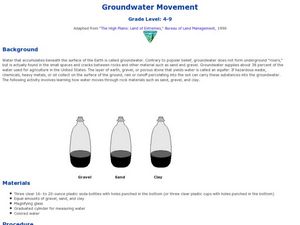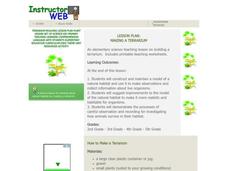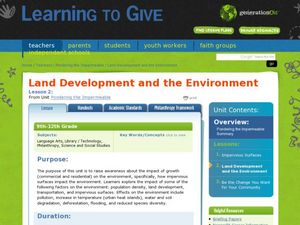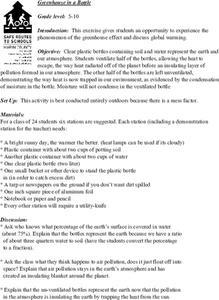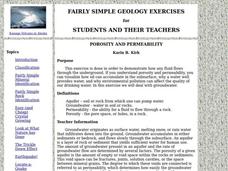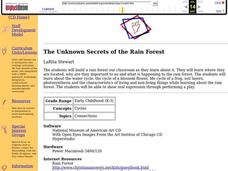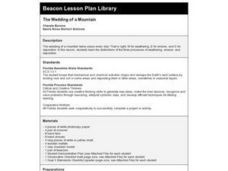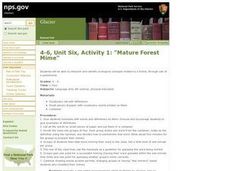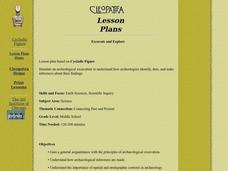Curated OER
Groundwater Movement
Students study groundwater movement beneath the surface of the Earth. In this agriculture lesson, students experiment with how water moves through rock materials such as sand, gravel, and clay.
University of Wisconsin
Rain Garden Maintenance
Maintaining a garden is an ongoing responsibility. This resource follows a series of activities in a unit that resulted in the planting of a rain garden. What you will find here are general instructions for watering, weeding, pruning,...
Curated OER
Ecosystems - Plants and Animals Together
Students study the biotic and abiotic factors of an environment. For this exploratory lesson students examine the different trophic levels and how organisms are connected.
Curated OER
Let's Make a Compost Cake
Students create a compost cake. For this gardening and decomposition science lesson, students review and describe the "nutrient cycle." Students create a compost pile, measure and record the dimensions and temperature of the pile, and...
Curated OER
Making a Terrarium
Students construct and maintain model of natural habitat, suggest improvements to the model of the natural habitat to make it more realistic and habitable, and demonstrate careful observation and recording of how animals survive in their...
Curated OER
Land Development and the Environment
Students examine the relationship between land development and the environment. In this environmental stewardship lesson, students explore how population density, land development, transportation, and impervious surfaces take their toll...
Curated OER
Trash Bashing
Students define trash, garbage, or solid waste, discuss ways of disposing of trash, list examples of biodegradable materials, and have trash relay race in order to sort trash into appropriate containers labeled biodegradable, reusable,...
Curated OER
Greenhouse in a Bottle
Students create models of the greenhouse effect using recycled 2-liter bottles. They discuss how their models compares to the real greenhouse effect the earth experiences.
Curated OER
Salt Marsh in a Pan
Students create a model of a salt marsh to discover the impact of pollution and human activities on water-based habitats including bays and the ocean. They recognize the relationship between natural and developed areas. Students impact...
Curated OER
Ecology of the Dump
Learners determine which types of garbage are biodegradable and which are nonbiodegradable. They practice measuring skills, hypothesizing, taking data, and writing a lab report. Students observe the relative biodegradability of metal,...
Arizona Geographic Alliance
Geography of Ancient Greece
In this geography skills worksheet, learners read a selection about the geography of ancient Greece and then respond to 6 essay, short answer, and graphic organizer questions based on the selection.
Curated OER
Changing Planet: Permafrost Gas Leak
Pair earth scientists up to use an amazing online arctic portal mapping tool and Google Earth to analyze permafrost changes. They compare changes to data on atmospheric concentrations of methane to see if there is a correlation. Then...
Curated OER
Water Quality
Students conduct experiments to study the quality of water. They examine how pollutants get into and affect the water supply in this unit.
Curated OER
Mighty Earth Movers
Note that although the publisher lists almost all of the Common Core standards for both math and language arts, you will most likely want to take the general topic and choose which area to focus on. Regarding math, pupils measure worms...
Curated OER
Porosity And Permeability
Learners participate in an exercise/experiment designed to show how environmental pollution can affect the quality of drinking water.
Curated OER
The Water Cycle
Students develop a better understanding of the need to conserve our renewable resources. In this water cycle lesson students take notes, complete a guide sheet and illustrate the water cycle.
Curated OER
The Unknown Secrets of the Rain Forest
Students listen to the story "The Great Kapok" then discuss characteristics of the rain forest. They make several different types of rain forest animals from paper plates (ex. sloth, tigers, monkeys etc) and design costumes for a...
Curated OER
Rate of Decomposition
Young scholars experiment with the decomposition rate of garbage. They discover that environments are fragile and need to be protected and resources are not always used wisely. They then think about their own environment and then about...
Curated OER
It's a Small World After All! (Pond Microcosms)
Students use microscopes to investigate the diversity of life that exists in pond water. They then conduct a controlled investigation to study the effect of a pollutant (rice) on a microcosm ecosystem.
Curated OER
The Wedding of a Mountain
Students examine the differences between weathering, erosion, and deposition as it pertains to mountains.
Curated OER
The Unknown Secrets of the Rain Forest
Young scholars explore the rain forest and where they are located. Students examine why the rain forests are important and what is happening to them. They investigate the water cycle and life cycle of a frog. Young scholars build a rain...
Curated OER
Where Does Your Garbage Go?
The objective of this lesson is to teach learners about the importance of recycling. Initially, students have a chance to think about their impact on our planet by following the path that garbage takes. Learners then learn about how...
Curated OER
Mature Forest Mime
Students come to understand vocabulary words through pantomime. For this vocabulary lesson, students first review several vocabulary words and their meaning, then they work in groups to pantomime the definitions.
Curated OER
Excavate and Explore
Students simulate an archeological excavation to explain how archeologists identify, date, and make inferences about their findings. They explain the importance of spatial and stratigraphic contexts in archaeology.
